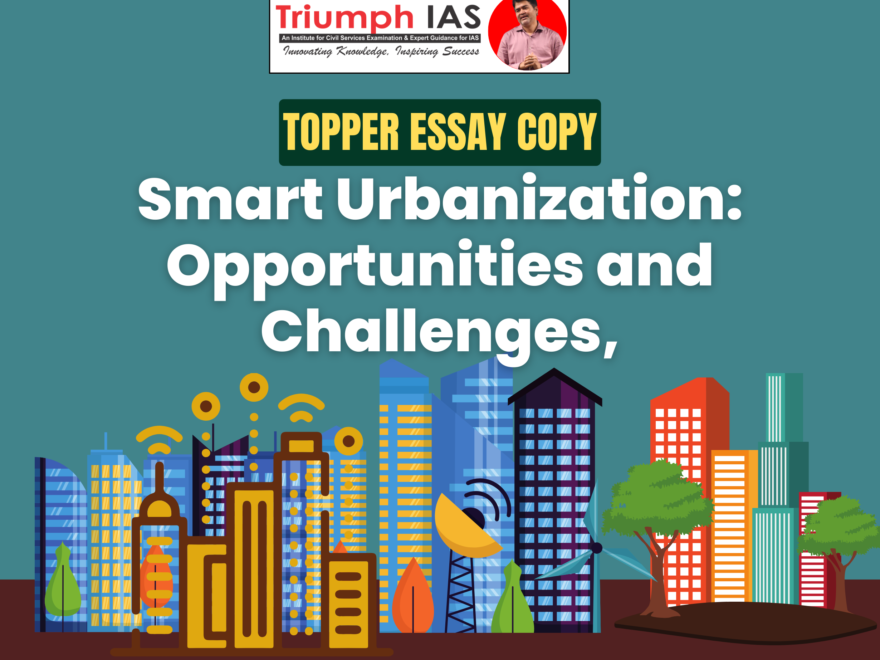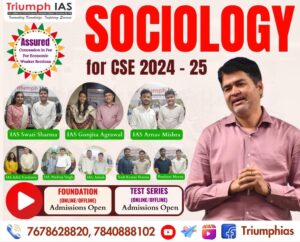IPS, SANKET KUMAR

Essay Topic:
Smart Urbanization: Opportunities and Challenges
(Relevant for Essay Writing for UPSC Civil Services Examination)
Smart Urbanization: Opportunities and Challenges21st century, a digital era heading for 4th industrial revolution is providing various ‘pull’ and ‘push’ factors from urban and rural areas respectively. Resultantly, people in large numbers are migrating from rural areas to urban areas for better life standards. Only in India, as per the 2011 census, 31% of the population is living in cities. UNESCO report has highlighted that by 2030, 40% of the Indian population will reside in urban areas and by 2050 it will increase to 50%. This figure is not only India-specific but common across the globe. Therefore, to provide the basic essential services in a timely and efficient manner, smart urbanization becomes imperative. Smart urbanization talks about the use of various technologies to gauge the customized needs of the people of the region and then delivering the services accordingly. In this essay, we will discuss the various opportunities of smart urbanization and challenges prevalent in realizing them. Finally, we will try to find the solutions for proper urban development. The importance of smart urbanization was realized even during the Indus Valley civilization. Though technologies of today’s time were not available then, they were still far ahead of their time. The division of cities into citadel & lower town, radial and rectangular streets, covered drainage with provision of manhole, separate service lane from the main road were the key tenets of the IVC urbanization. During the medieval period, the Tughlaq dynasty especially Firoz Tughlaq gave explicit focus on modern city building. As he realized their importance for industrial development (i.e., artisans, kharkhanas etc). Learning from those, the model of smart urbanization is almost similar providing various opportunities in the social sphere. Through promoting ‘inclusive development’, where both locals and outsiders live happily together. It curtails the phenomena of ‘son of soil doctrine’ leading to extreme regionalism e.g., Gujarat Exodus. For women, it provides a safe and secure environment free from the fear of violence, eve-teasing etc. Smart urbanization provides cameras installed everywhere on roads, digital connectivity to police stations (like using an app to directly complain). Due to this strict surveillance, women feel empowered. For elders, disabled individuals, and transgender individuals, smart urbanization enables providing accessibility to public buildings, installation of ramp walks and elevators in subways and over bridges. Even for transgender individuals, it assures gender-friendly toilets and a fearless atmosphere. Cities today are facing the problem of ‘slum growth’, as in Mumbai approximately 3-4 million people are living in slums. As smart urbanization provides housing facilities for all with all necessary basic facilities. Thus upholding the right to dignity of the poor and migrants. One of the most important aspects of cities is sewage and solid waste management. Through sensor-based monitoring of sewage pipelines reading pressure changes due to garbage entrapment, it provides for clean and effective sewage management. Also, by installing sewage treatment plants and solid waste disposal by incinerator, smart urbanization resolves the problem and provides a cleaner city. Another opportunity is 24×7 availability of drinking water. Through the installation of sensors controlled by a central processing unit, monitoring seamless water flow has become much easier and effective. Smart urbanization also provides an opportunity for ‘good governance’. Through real-time data collection and processing using advanced computational facilities, more customized and need-based solutions for governance deficits can be devised, thus providing good governance. It also brings transparency and accountability along with people’s participation in the governance process. It also solves the problem of livelihood opportunities by attracting industries and companies. Further by organizing them in clusters of special economic zones, business prospers intimately leading to job creation e.g., Sricity in Andhra Pradesh is providing employment to thousands in nearby areas. By real-time monitoring of traffic, problems of traffic jams can be solved. Further through collecting traffic data, a better traffic system can be devised. Smart urbanization also provides an opportunity for new, advanced greener public transport. Through the construction of metro lines and provision of CNG buses running on separate lanes, efficient and effective public transport is ensured. Thus transporting more people instead of moving vehicles (from urban transport policy). Pollution-free urban space is another opportunity of smart urbanization. By promoting greener transport and keeping a check on pollutants emitted from industries, fresh air is provided to the residents. Better water treatment plants with a focus on reuse, recycle, and reduce water pollution are also curtailed. The opportunity for open spaces and public gardens improves the standard of living for people. Further smart urbanization also controls urban sprawl and provides for proper prior planning before expansion. Challenges: First, a challenge is about the ‘definition’ of cities. Currently, various statutory and legal provisions define cities in different manners. This creates confusion for local administrative bodies in deciding the boundaries of urban spaces. As statutory definitions talk about a minimum of 400/sq km of population density, with at least 8000 populations and 75% employed should be non-agricultural sector whereas census definitions provide for the presence of any ULB for classification as focus. Next challenge is related to infrastructure. As smart urbanization requires complete infrastructural overhaul of cities, but ULBs are deficient in funds. Even state and central governments are not providing them with adequate funds. Also, for Greenfield infrastructure, land acquisition is required, which is a big challenge in India due to the absence of comprehensive land acquisition law. Further Brownfield infrastructure disrupts the normal life of areas. As metro construction in Delhi invites lots of traffic jams and congestion. Next challenge is governance-related challenge. The existence of parallel bodies with overlapping mandates promotes inefficiency and deficit of cooperation with ULB. ULBs constituted with 74th constitutional Amendment Act have not been sufficiently empowered by state governments. They are struggling with a lack of funds, finances, and functionaries. Also these administrative units are breeding grounds for corruption deteriorating governance further. Lastly issues with data collection are hampering progress. As it is clear that a vast amount of data will be collected and stored in some central database. These data are prone to cyber vulnerability. Also, information can be misused by the government for malafide purposes violating the fundamental right to dignity and privacy. Way Forward: The central government should provide a standard uniform definition of ‘urban cities’ across India. Further should empower ULBs financially to start the infrastructural projects. Amendments to existing land Acquisition Act are imperative. State governments should provide adequate power to ULBs to enable them to function as autonomous bodies. Digitalization of Administration will bring openness and fasten the infrastructural implementation Process. As per recommendations of ___ ____ committee ‘Data protection law’ is the need of the time. Blockchain has the potential for realizing smart urbanization. AMRUT, SMART CITY, HRIDAY, DMAY, NEW METRO POLICY are few appreciable steps in this regard. Therefore to ensure the pace of economic development focus has to be concentrated on realizing smart urbanization. This can be done on the principle of ‘Sabka Sath, Sabka Vikas, Sabka Prayas’. |
To master these intricacies and fare well in the Sociology Optional Syllabus, aspiring sociologists might benefit from guidance by the Best Sociology Optional Teacher and participation in the Best Sociology Optional Coaching. These avenues provide comprehensive assistance, ensuring a solid understanding of sociology’s diverse methodologies and techniques
Meta Tags:
Urbanisation, Blessing, Disguise, Economic Growth, Cultural Diversity, Environmental Challenges, India, Social Inclusion, Sustainable Development, SDG Goals, Urbanization is a blessing in disguise, Laxman Tiwari, Laxman Tiwari upsc, Laxman Tiwari CSE, Laxman Tiwari Essay copy, Laxman Tiwari Essay test copy

Why Vikash Ranjan’s foundation Classes for Essay?
Proper guidance and assistance are required to learn the skill of writing essay topics in CSE examination. VIKASH RANJAN SIR at TRIUMPH IAS guides students according to the Recent Trends of UPSC, making him the Best Essay Teacher for Essay writing UPSC.
At Triumph IAS, the Best Essay Writing Coaching platform, we not only provide the best study material and applied classes of Essay for IAS but also conduct regular assignments and class tests to assess candidates’ writing skills and understanding of the subject.
Choose The Best Essay Writing Teacher for IAS Preparation and Know our Approach for Essay?
- The Programme is Planned & Executed in a Way that You Write a good Essay for obtaining Effective Score of 140 Plus.
- In this programme we provide Classes on
- How to INTRODUCE The Topic in Context of the THEME of the Essay
- How to Elaborate & Explain the Topic-Theme on Temporal Scale & Sectoral Scale as well as Intellectual Scale in the MAIN BODY of the Essay.
- How to Sum up the Topic in CONCLUSION in Context of the Essay Topic Theme.
- ︎We will Teach You How to use the Knowledge Matrix of General Studies & Optional to write a Good Essay more Logically and Coherently.
- After the Classes You have to “Write to Learn & Learn to Score” .This means You have to Write the Essay Test Papers & Learn from the Feedback & Discussions.
Why Essay is Important and What We Offer in “Essay Test Series”?
- Triumph’s Essay Upgradation Test Series (Under Personal Guidance of Vikash Ranjan Sir) doesn’t only focus on improving student’s linguistic skills but also focus on improving student’s ability to comprehend the topic-sentence (subject) recall & relate the facts, concepts, propose thesis-statements, and logically assimilate the ideas & counter ideas with clarity in expression on temporal & Sectoral Scales of knowledge.
- Further students are provided one-on-one INTERACTION* Session with Vikash Ranjan Sir. Students get personal feedback on their strength and weaknesses, regarding what is ‘good about their essay and what more should be done to make it a better one’ by Vikash Ranjan Sir.
Why to take up this “Essay Test Series and Foundation” Course?
- Essay is Low hanging Fruit. Marks in Essay is Effectively Contributing in Final Selection in New Pattern of Mains Exam. With a Well Developed ‘Knowledge Matrix and Rigorous Practice’, One can Score upto 160 + in Essay. So IAS Aspirants should never Ignore Essay Preparation
- Inculcating Writing Competency in Essay for IAS, which is Different from Essay in English, Essay in School and College.
Follow us :
🔎 https://www.instagram.com/triumphias
🔎https://www.youtube.com/c/TriumphIAS
🔎https://t.me/VikashRanjanSociology
Find More Blogs…
| Compare and contrast Karl Marx’s and Max weber’s | Karl Marx- Historical Materialism |
| Position of Women In the Modern Indian Society | Sociology: Social system and pattern variables |
keyword: Smart Urbanization: Opportunities and Challenges, Smart Urbanization: Opportunities and Challenges, Smart Urbanization: Opportunities and Challenges, Smart Urbanization: Opportunities and Challenges, Smart Urbanization: Opportunities and Challenges, Smart Urbanization: Opportunities and Challenges, Smart Urbanization: Opportunities and Challenges, Smart Urbanization: Opportunities and Challenges, Smart Urbanization: Opportunities and Challenges, Smart Urbanization: Opportunities and Challenges, Smart Urbanization: Opportunities and Challenges, Smart Urbanization: Opportunities and Challenges, Smart Urbanization: Opportunities and Challenges, Smart Urbanization: Opportunities and Challenges, Smart Urbanization: Opportunities and Challenges, Smart Urbanization: Opportunities and Challenges, Smart Urbanization: Opportunities and Challenges, Smart Urbanization: Opportunities and Challenges, Smart Urbanization: Opportunities and Challenges, Smart Urbanization: Opportunities and Challenges,


